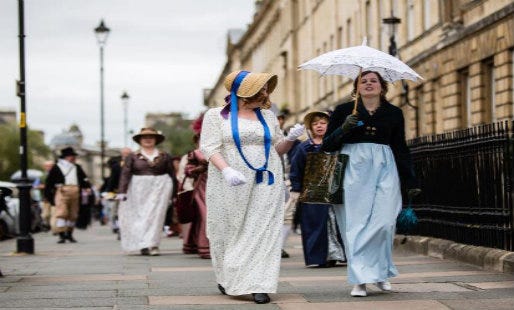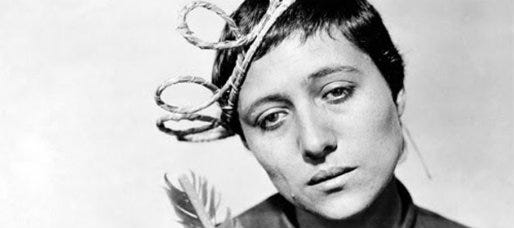Bath Film Focus
Every month, I’ll introduce you to some little-known British films and even some from across the Channel in Europe, along with any entertaining pieces of news or perhaps an actor or director profile of someone well known or someone up-and-coming.
Bath Film Focus

This month’s commentary looks at three highlights of the 23rd annual Bath Film Festival, due to begin in a week’s time. There is a steadily growing community of film buffs and aficionados led by the Bath Film Office, which is responsible for screenings and location shoots in Bath and beyond.
This year, more than 50 films are being screened at various locations throughout the city, and the festival begins with a very special showing of a classic featuring a very unique performance.
“The Passion of Joan of Arc” (1928)

A great classic of the silent film era is getting a new lease on life and will kickstart a great year for the local festival.
The film centers on the events surrounding the trial of French Saint Joan of Arc (Maria Falconetti) at a time when the country and its power were greatly diminished. A bit of history: On divine instruction from God, at the age of only 19, she led the French army in battle to hasten the English from France. She led them to many victories during the Hundred Years’ War but was captured and sold to the English to be put on trial for heresy. A guided tour of the torture chamber did nothing to dampen her spirit. She was eventually burned at the stake after being forced to sign a confession.
The film’s portrayal surrounding the trial of Joan was famed for its unusual use of short and sharp close-up shots that hadn’t been used before, as well as a thoroughly expensive set built in Europe, which even included a functional drawbridge. It’s directed by Dane Carl Dreyer who, after a career in journalism, wrote title cards for silent films, eventually moving on to screenplays and directing.
Accompanied by a musical score composed by British musicians Will Gregory from electronic music duo Goldfrapp and Andrian Utley from Portishead and performed by an orchestra of more 20 instrumentalists. “The Passion of Joan of Arc” will be screened at the medieval Bath Abbey on the opening night of the festival.
British Sci-Fi: “The Machine” (2013)
During a time in the future when Britain is in a state of permanent economic depression, Dr Vincent McCarthy (Toby Stephens, 2006's “Severance”), a scientist for the Ministry of Defense, is working on a project creating a new kind of artificial intelligence.
He successfully builds a prototype machine, but it fails to pass the Turing test to see if it displays human intelligence). Fellow scientist Ava (Caity Lotz, 2012's “The Pact”) is brought on board, as she has developed a computer that can converse with itself. After she is involved in a fatal accident, McCarthy uses her likeness to create an android and brings it to life.
“The Machine” is director Caradog W. James’ second feature, and he adds a very dark quality to an idea that has been used many times in cinema. It’s an issue the director believes accurately reflects views surrounding artificial intelligence that are still relevant today.
Screened at the Tribeca Film Festival earlier this year, the BFF will show “The Machine” at the Masonic Hall in Bath — what used to be the city’s Theatre Royal, which dates back to the 1700s.
French Cinema: “Marius” and “Fanny” (2013)

The first two films in a three-part film series detailing the love story between Marius (Daniel Auteuil, also the director) and Fanny (Victoire Belezy) and also a much older man, Panisse (Jean-Pierre Darroussin).
Their story is already familiar to us, thanks to a force-feeding of a shed load of rom coms throughout the last 30 years or so. Back when it was originally written as a play, this story was probably still fresh and decidedly cute and romantic. The Southern France setting, despite being set on the docks, is rather glamorous, made more so by the golden glow that seems to emanate from the screen — that and the passions of unrequited love of a young man for a local cockle seller.
Marius works at his father’s bar on the waterfront in Marseilles and is a man with two great desires in life — his childhood friend Fanny and the lure of worldwide travel heightened by his proximity to the many voyages departing in front of the bar.
When Fanny is lured into the arms of factory worker Panisse, Marius’ jealousy gets the better of him and he confesses his love to Fanny. Delightfully, she reciprocates, but his attentions are being pulled away by his need for adventure on the open seas and the couple has to make a life-altering decision.
Set in the 1920s, the three films form part of a set titled the "Marseilles Trilogy," written by Marcel Pagnol, a French writer and filmmaker.
The festival will be screening Part 2 as well, titled “Fanny." It begins where “Marius” leaves off, quite literally, as it centers on Fanny and her life after her lover and friend sets sail. She is, of course, left vulnerable to Panisse and his advances. Discovering Fanny is pregnant with Marius’s child, her mother and Marius’ father assist in wedding her to Panisse; raising a fatherless child in the 1920s was definitely not done.
The third film in this French romantic saga, “Cesar," from the point of view of Marius’ father, is still yet to begin filming. It’s set many years later when Fanny and Marius’s son is grown, and she learns that he is back in Marseilles.


